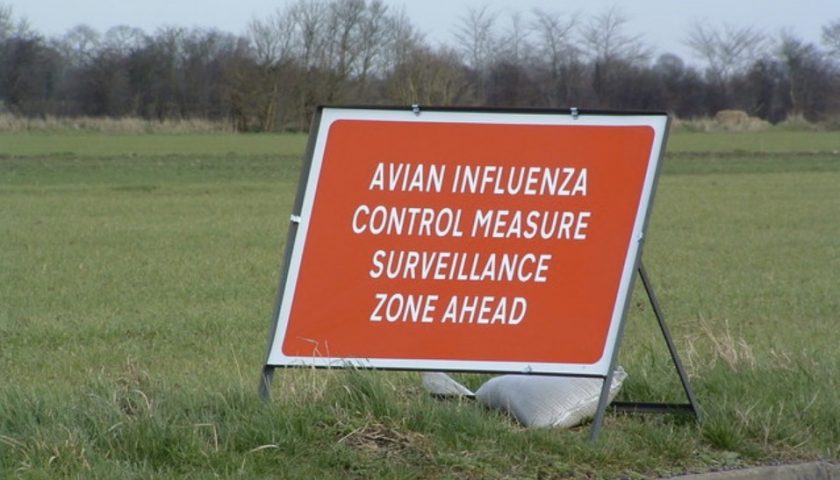Bird flu prevention zone declared across whole of UK following case in Chirk

Following a number of detections of avian influenza (bird flu) in wild birds across Great Britain, the Chief Veterinary Officers from Wales, England and Scotland have declared an Avian Influenza Prevention Zone (AIPZ) across the whole of Great Britain to mitigate the risk of the disease spreading amongst poultry and captive birds.
On 27 October, the Chief Veterinary Officer for England confirmed a case of Highly Pathogenic Avian Influenza (HPAI) H5N1 at a wild bird rescue centre in Worcestershire, England. Further to this case in England, on 2 November, and following a number of wild bird positive findings of AI across Wales, England and Scotland, the Chief Veterinary Officer for Wales confirmed a case of HPAI H5N1 in a small backyard flock of chickens in Wrexham.
From 5pm on Wednesday 3 November 2021, it will be a legal requirement for all bird keepers in Great Britain to follow strict biosecurity measures to help protect their flocks.
Keepers with more than 500 birds will need to restrict access for non-essential people on their sites, workers will need to change clothing and footwear before entering bird enclosures and site vehicles will need to be cleaned and disinfected regularly to limit the risk of the disease spreading.
Avian influenza circulates naturally in wild birds and when they migrate to the UK from mainland Europe over the winter they can spread the disease to poultry and other captive birds.
Backyard owners with smaller numbers of poultry including chickens, ducks and geese must also take steps to limit the risk of the disease spreading to their animals.
The UK health agencies advise that the risk to public health from the virus is very low and the UK food standards agencies advise that avian influenzas pose a very low food safety risk for UK consumers. Properly cooked poultry and poultry products, including eggs, are safe to eat.
The introduction of the AIPZ comes after the disease was detected in captive birds at premises in Wales, England and Scotland. The disease has also been detected in wild birds at multiple sites across Great Britain.
In a joint statement the Chief Veterinary Officers for Wales, England and Scotland said:
Following a number of detections of avian influenza in wild birds across Great Britain we have declared an Avian Influenza Prevention Zone across the whole of Great Britain. This means that all bird keepers must take action now to prevent the disease spreading to poultry and other domestic birds.
Whether you keep just a few birds or thousands, you are now legally required to introduce higher biosecurity standards on your farm or small holding. It is in your interests to do so in order to protect your birds from this highly infectious disease.
The UK health agencies have confirmed that the risk to public health is very low and UK food standards agencies advise that bird flu poses a very low food safety risk for UK consumers.
The introduction of an AIPZ zone follows a decision to raise the risk level for avian influenza incursion in wild Birds in Great Britain from ‘medium’ to ‘high’.
For poultry and captive birds the risk level has been raised from ‘low’ to ‘medium’ at premises where biosecurity is below the required standards, but remains ‘low’ where stringent biosecurity measures are applied.
The AIPZ now in force across GB, does not include a requirement to house birds. However, this is being kept under constant review.
With the increased risk of Avian Influenza during the winter, the need to include a mandatory housing requirement in the AIPZ may arise.
Further disease control measures will be based on the latest scientific evidence and veterinary advice.
The Avian Influenza Prevention Zone (AIPZ) means bird keepers across the country must:
- Keep domestic ducks and geese separate from other poultry.
- Ensure the areas where birds are kept are unattractive to wild birds, for example by netting ponds, and by removing wild bird food sources;
- Feed and water your birds in enclosed areas to discourage wild birds;
- Minimise movement in and out of bird enclosures;
- Clean and disinfect footwear and keep areas where birds live clean and tidy;
- Reduce any existing contamination by cleansing and disinfecting concrete areas, and fencing off wet or boggy areas.
- Keep free ranging birds within fenced areas, and that ponds, watercourses and permanent standing water must be fenced off (except in specific circumstances e.g. zoo birds).
The prevention zone will be in place until further notice and will be kept under regular review as part of the government’s work to monitor and manage the risks of bird flu.
Poultry keepers and members of the public should report dead wild birds to the Defra helpline on 03459 33 55 77 and keepers should report suspicion of disease to APHA on 0300 303 8268. Keepers should familiarise themselves with our avian flu advice.
Spotted something? Got a story? Email: [email protected]
Latest News
